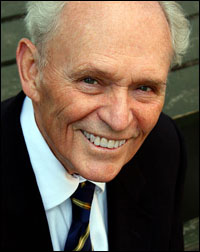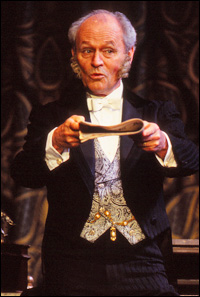
*
Satire is what closes on Saturday night, George S. Kaufman famously said, and, when the curtain falls on the 8 PM Sept. 3 performance of Broadway's The Phantom of the Opera, it falls on two of that production's most conspicuous practitioners, George Lee Andrews and David Cryer.
Respectively, they play Monsieur Andre and Monsieur Firmin, the fussy, fastidious managers of the Opera Populaire in Paris during its chaotic ghost-haunted period (in the late 19th century), and, what's more, the two actors have played these roles longer than anyone.
In fact, Andrews holds the Guinness World Record for the longest time in the same show (9,382 performances, to put a fine point on it) — a feat he achieved in four roles over 23½ years, beginning in the ensemble as Don Attilio and Passarino for the first 656 performances. Then, director Harold Prince anointed him Monsieur Firmin and, after 4,329 performances of that, had him switch to the other half of that managerial act, Monsieur Andre, which he wraps up Sept. 3 with Performances 4,396 and 4,397.
Cryer played Monsieur Firmin for 13 years on the national tour — plus 2,144 more on Broadway opposite Andrews, making a combined U.S. total of more than 7,500. He's also Evita's longest-running Juan Peron, logging up more than 1,000 performances on Broadway, and has turned in more performances of The Celebrant in the Bernstein Mass than anyone (six different productions including The Met). Since January 2006 they have shared a tiny, two-chaired dressing room on the third landing of the Majestic Theatre — "320 up and, luckily, 320 down," cried Cryer ,who has counted them — and that's where they were found prepping for one of their last outings. By the official decree of producer Cameron Mackintosh (who similarly "freshened" the 10th anniversary cast of Les Miserables, replacing about a third of the company), the 68-year-old Andrews and the 75-year-old Cryer did not get their six-month contracts renewed. Andrews' contract had been renewed 40 times, but, taking some of the sting out of this turn of events, is the fact Monsieur Andre will be played by his son-in-law, Aaron Galligan-Stierle, 31, which at least keeps the role in the family.
The actors spoke to us on Sept. 1, two days before their exit from Andrew Lloyd Webber's musical.
So what does it feel like getting to the light at the end of the tunnel?
George Lee Andrews: Well, it's very all jumbled up right now. People keep asking me, "Well, how do you feel?" Right now, I just feel normal.
David Cryer: We feel like we've got a show to do.
GLA: Thank God! Okay, so I came in tonight and I made a joke about the fact that we got our paycheck and I said, "That's our last paycheck." I made a joke about it, but I thought, "This should be really hitting me," but I'm not emotionally attached to it yet. I guess I have to wait until Monday night when I'm watching my son-in-law do the role.
DC: No pressure!
Poor guy! Having to do a role his father-in-law did for the past 23 years! Is your daughter [Jennifer Lee Andrews] an actress?
GLA: She was an actress in college and just after college, but she's a teacher, really — a special ed teacher.
How did you get The Word that your contracts weren't being renewed?
DC: We got Post-It notes from our stage manager to see Steve Greer, who is our company manager, so I thought, "What is this about?" The next day we went into the office. I thought, "Well, it must be they're having the 25th anniversary of Phantom over in London, and we're being invited to represent America since we're the elder statesmen. [Not getting renewed] came as a big surprise. However, when David Caddick [the musical supervisor] came in with a kind of dour look on his face, we knew something was not right!
GLA: Hal [Prince] was on the phone. Hal was on a conference call in the office with us and the company manager and the production manager — and a letter from Cameron. That's how we were told. It was very respectful — shocking and sad.
How long ago was this?
DC: April 28. I will always remember it. Four o'clock — they were late, actually. [Laughs.] And if we're late, we get a letter.
But you must look back on this whole experience with a lot of affection.
DC: Oh, absolutely. We consider it a huge blessing and a gift.
When you do your scenes together, are you ever tempted to play games with each other?
DC: I respect the show too much to do that. I think it messes up the show when you start doing that. It gets confusing to the audience. We, actually, really concentrate on doing the show as best we can every night. That's what we both feel about doing the show, and that's what we do.
| |
 |
|
| David Cryer |
GLA: Just that there's always plenty to work on, that's all. There's not anything really earthshakingly different about them, except that there's always room for improvement — in many ways: comedy, the drama of the show, the singing, the working with the music, the movement. All those things definitely bear working on all the time.
DC: I have to say I think we've gotten better in the parts. I'm not going to tell George some of the things I think he does better, because it will ruin him for the last four performances. And I have a few things I know I'm doing better, and I don't want him to tell me.
How many Phantoms have you been through?
GLA: Me? I've had 12. Howard McGillin was in it for seven years and a couple of times, and Hugh Panaro has been in three times so people are in and out, but all told there have been 12 and something like four substitute Phantoms, who are phantoms but they weren't real phantoms. They were in for a limited run — and then untold understudies.
Do you remember the 1988 opening night party at the Beacon, George?
GLA: Yes. I remember it was a crazy night of fun. It was a wonderful cast, and we were already good friends at that point, having gone through the rehearsal process. Everybody was thrilled to be in Phantom. We knew we were in for a nice ride — a long ride, probably — and so everyone was feeling at the top of their game. I just remember it was all lights and swirling and black and white decor and tinsel.
Who were you playing then?
GLA: I played what I like to say as four featured roles, but they were all really one man. In the opera companies, they call him The First Singer. He's the man in the opera company who does the leads opposite the stars. The stars are brought in. This guy stays in the company and plays all the principal roles in each opera. In Hannibal, I'm the Lion Man. In Don Juan, I'm Passarino. In Il Muto, I'm Don Attilio. Then in the rehearsal, sitzprobe, I'm myself.
DC: I thought he was the funniest thing in the show when I saw it, when he was Don Attilio, the guy who sings the low notes. I was proud.
| |
 |
|
| George Lee Andrews |
DC: What I like about him is that he's really dedicated to making money. That's the thing. He's not so interested in Carlotta. He's much more interested in the ballerinas.
George, did you ever give any notes to this guy, since you've played Firmin before?
DC: He gave me a note the other day. Oh, yes, "Don't make me sit on the elephant." He just calls it an elephant. It's really a letter box. I was sitting a little bit stage left, and making him sit right on the elephant.
I would think you would have spots in front of your eyes after playing the show so much. GLA: No, we don't. We're strange. We're just naïve people or something.
DC: We're live theatre people. We go out there every night and just "get fresh," just walk on stage and make it be alive and make it be fresh.
How do you do that?
GLA: It's just training. Someone said to me, "How do you stay interested?" I said, "How do I stay interested?" I'm walking out on stage, becoming a different character in this opulent production of this brilliant musical in front of 1,600 people. I have to do something to stay interested? I'm the luckiest man in the world. This is brilliant, and I'm aware of it every night. Also, I get: "Do you carry 9,000 performances on your shoulders when you go out there?" No. I have no consciousness of that. I only know, as David says, we have a show to do tonight so we're here, we're getting ready, we're starting to think about it, talking, getting ourselves in the mood — and then we go.
That poor guy who was in the last Cat on a Hot Tin Roof who said, "Eight times a week! I can't do that!" He was a film actor, I believe.
DC: There are people who really can't stand it. I remember Mandy Patinkin just couldn't stand doing Evita all those times a week.
It must be wonderful to have these roles in Phantom where you can be ageless.
DC: Yeah. I thought, "Oh, God, it's fine to have old people on stage with young people." It makes it more interesting — old people who are still lively, anyway.
Leila Martin played your Madame Giry and held it a long time, too.
GLA: She did. She was wonderful, hard to beat — definitive in that role, really.
When did you realize you gave the greatest number of performances?
GLA: Y'know, the only way I figured it out was, when Phantom became the longest-running show in Broadway history, I said, "Wait a minute. I'm the only one here who was here from the beginning. If we're the longest-running show in Broadway history, that must make me the longest-running actor in Broadway history. That's when it came to me. Someone said, "You ought to look into that Guinness World Record thing. You have the Guinness World Record," and I thought, "Okay," so I did it as a lark. They wrote me back and said, "We don't have a category like this. This is a brand-new category, so send us this-this-and-this documentation and then we'll see." That's how it happened.
I think they just numbered the number of performances that I was a member of the company. I don't know how we would know how many I have actually done because I've been on vacation and had a few sick days, but I haven't missed many. But I took three months off recently to go to London, so I don't know how you would gauge it.
But you went to London to work. Is that [Hal Prince's new musical, Paradise Lost] ever going to happen over here?
GLA: The last I heard, he's still working on it.
In Merlin, George, you were the Old Merlin, the old Doug Henning.
GLA: Yes — and do you know who the young Merlin was? Christian Slater.
Do you know what Nathan [Lane] called that show?
GLA: What?
"The show that wouldn't disappear."
DC: However . . .
GLA: We had a lot of fun doing that show. That's because there wasn't much show there so we had a lot of fun.
That's the only one of your four Broadway credits that isn't Hal Prince-related. He's been a great director for you, hasn't he?
GLA: He has. He has been wonderfully loyal in the way of getting me into those shows.
You were Hermione Gingold's butler in A Little Night Music. I only realized in the recent revival that that was a pretty sexy butler.
DC: Oh, you should have seen George. For sexy. He had blond hair down to his shoulders.
GLA: Yeah, he was very sexy. He was supposed to be sexing up the maid, Petra.
You went from butler to head of the house, Fredrik, when you toured with Jean Simmons. What was that like?
GLA: She was the best — lovely, beautiful, a great pal. She played tennis, y'know.
DC: I did not know that. That's where you learned your tennis.
GLA: She was a great game person, ready to have fun. Great in the show, and a lovely lady. And beautiful to look at — always. Her movies come up on TCM, and I'm like, "Wow! I played opposite that girl. Look how gorgeous she is." And Margaret Hamilton was a great, wonderful person to tour with, too.
You originally had a song in that show.
GLA: It was called "Silly People." It was cut in Boston, but then they put it in the first Sondheim tribute. I did it with a gorgeous Jonathan Tunick orchestration, and that was recorded, so it wasn't lost. It was so nice because, otherwise, I was coming into New York in a brand-new Steve Sondheim show not singing a note. That's, like, embarrassing.
You've done shows with Hal, too, haven't you, David?
DC: Well, basically Evita. And he told me I was coming back into A Little Night Music, but it closed before then — and I was in A Little Night Music with George's daughter at the Walnut Street Theatre in Philadelphia with Ron Raines — and Hugh Panaro was my son.
You both have children who act. Did they get that from you?
GLA: Sure. We never said, "Would like to try it?" — but they wanted to try, and we let 'em.
DC: The story with Jonny [Jon Cryer of TV's "Two and a Half Men"] was that we tried to get him into science because he did go to Bronx High School of Science, but he was in West Side Story there, and there that went.
I'm very happy to be going out to California next week because I get to see Jonny get his star on the Hollywood Walk of Fame so this is very nice that I am fired now and free to go.
GLA: But we'll both be looking around for other stuff and auditioning. We're still around.
DC: Yeah. Can't wait.
Do either one of you have favorite roles?
GLA: This role is a definite favorite, but I've played roles, over the years — and I'm sure David has, too — that I've loved playing: Hajj in Kismet, Man of La Mancha, Curly in Oklahoma!, Carousel. It's like, y'know, "When I'm Not Near the Girl I Love, I Love the Girl I'm Near." That's the way I am about shows. People always say to me, "What's your favorite role?" and I say, "I'm really happy right now, doing what I'm doing. I'm love this role, so that's really my favorite right now."
| |
 |
|
| David Cryer | ||
| photo by Joan Marcus |
DC: When I did Oklahoma!, it was community theatre, but the choreographer was from New York, and he said, "You could be a professional." That's what got me into the business. I'm so glad because I was going to go to law school, and that would have meant death — although I've sometimes wished I was making law-school kind of money.
Has either one of you got irons in the fire out there right now?
GLA: He's got a little iron out there.
DC: I got a little iron. I'm going up to Boston next week to be in a video of the Kefauver hearings about the mob. I'm going to play the senator from New Hampshire, Senator Charles Tobey. And this is going to be in The Museum of the Mob, in Las Vegas. It's a film for the museum. They're recreating the Kefauver hearings of 1950 when actually this Rico Law was enacted. I happen to look like Tobey, and I can do a New Hampshire [accent].
You've done a lot of television in New York. Was it hard to do that and Phantom at the same time?
DC: Well, I seldom did them at the same time. I was in "As the World Turns" for a year and a half — and a show called "Where the Heart Is" for three years. And some "Law & Order."
Have you done television, George?
GLA: No.
Did you do features?
GLA: No. I've done a couple of commercials. Mostly, just eight shows a week.
We've been very glib, but is there a sorrow about leaving?
GLA: Yeah. The main thing we'll miss is doing the show.
DC: Oh, yeah.
GLA: We love being together in here. We love doing the show. And we love this family that we worked with here. To come to this family every night and work with all of these people — that, we're going to miss.
DC: And the paycheck.
GLA: And the paycheck.










